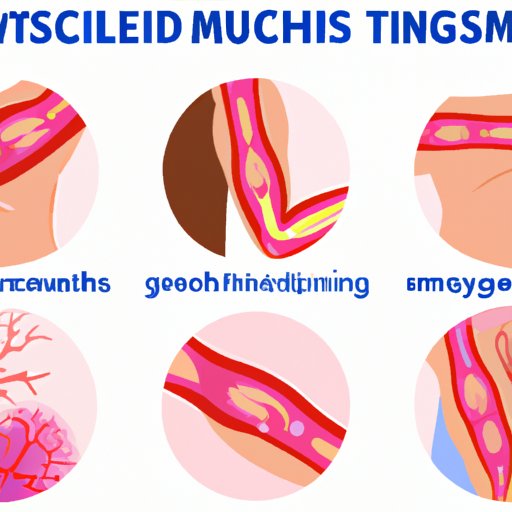
Introduction
Have you ever experienced muscle twitching that won’t seem to go away? Muscle twitches are common and can be a nuisance, but they can also signify a more serious underlying health condition. In this article, we discuss how to stop muscle twitching effectively.

Understanding Muscle Twitching: Causes and Symptoms
Muscle twitching, also known as fasciculation, refers to the involuntary contraction and relaxation of muscles. This is a condition that affects individuals of all ages and usually occurs in isolated instances, but can become persistent and problematic.
One common cause of muscle twitching is stress and anxiety. When you’re stressed, the body releases a hormone called cortisol, which can cause muscle twitching. Other causes include caffeine intake, dehydration, and muscle fatigue, among others.
Symptoms to look out for include mild contractions of muscles or a sudden jolt of a limb or body part. In many cases, muscle twitching is painless and harmless.
Top 5 Effective Home Remedies to Stop Muscle Twitching
There are several natural and simple remedies to stop muscle twitching. Here are five of the most effective remedies:
Rest and Relaxation
Try to rest and relax when you start experiencing muscle twitching. Take a break from exercising or doing strenuous physical activities and engage in relaxing activities like deep breathing exercises, yoga, or meditation.
Hydrating the Body
Dehydration can also trigger muscle twitching. Drinking enough water and fluids like fruit juices and sports drinks can replenish fluids and electrolytes lost through sweating especially during exercise.
Application of Heat or Cold
Heat or cold application is a relieving remedy for muscle twitching. A warm towel or a hot water bottle can help ease muscle tension, while cold compresses can alleviate inflammation and muscle soreness.
Magnesium Intake
Magnesium is an essential mineral that helps keep muscles relaxed. A deficiency in magnesium may result in muscle twitching and cramps. Eating magnesium-rich foods such as almonds, peanut butter, spinach, and oatmeal can provide relief for muscle twitching.
Herbal Remedies
Many herbs have potential benefits to treat muscle twitching. Some of the most commonly used herbs include chamomile, passionflower, lavender, and kava kava. These herbs are available in many forms, including powders, capsules, and teas.
How to Stop Muscle Twitching in Legs and Arms
Twitching in legs and arms may be caused by a number of factors like fatigue, nerve damage, and dehydration among others. While the above remedies can provide relief, there are other methods that can directly help these areas.
Physical Therapy Exercises
Physical therapy exercises can help alleviate muscle twitching in legs and arms. Exercises like stretching, squats, lunges, and leg presses can help to improve muscle strength and elasticity.
Massage Techniques for Legs and Arms
Muscle massage can help relieve muscle tension. Simple practices like reflexology and acupressure massage can ease the tension and loosen muscles in the legs and arms.
Stretching and Proper Posture
Stretching of muscles in legs and arms can also lessen twitching and improve flexibility. While proper posture, especially during sitting and standing can also reduce the pressure on the muscles and reduce twitching in those areas.
Diet and Nutrition to Prevent Muscle Twitching
Eating a balanced diet with the right amount of nutrients can also help to prevent muscle twitching.
Importance of a Balanced Diet
Having a healthy and balanced diet is essential for overall body functioning. The recommended daily intake by nutrition experts include a combination of fruits, vegetables, whole grains, and lean protein sources like chicken and fish.
Nutrients Needed to Prevent Muscle Twitching
Some of the important nutrients needed to prevent muscle twitching include iron, potassium, and vitamin B6. Iron-rich food includes spinach, lentils, and beef. Potassium is found in bananas, kiwis, and avocados. Vitamin B6 is in whole grains and lean proteins like fish and chicken.
Types of Foods to Eat and To Avoid
Some food types like caffeine, alcohol, and highly processed foods can lead to dehydration and should be avoided. Foods with high sugar content should also be avoided since they interfere with the absorption of essential nutrients like magnesium, and other electrolytes.
Physical Exercise and Massage to Treat Muscle Twitching
Exercise and massage are proven methods to stop muscle twitching and can improve overall body health.
Recommended Physical Exercises to Treat Muscle Twitching
Exercises like yoga, swimming, running, and cycling help to improve muscle strength and circulation, which can help to reduce muscle twitching.
Different Types of Massage Recommended to Stop Muscle Twitching
Different types of massage like deep tissue massage, trigger point massage, and lymphatic massage can all help to relieve muscle tension. Additionally, getting a sports massage before and after a workout helps to ward off muscle twitching.
Medical Treatment for Severe Muscle Twitching: When to See a Doctor
If muscle twitching persists and becomes severe, it may be necessary to see a doctor.
Signs of Severe Muscle Twitching
Watch out for signs like muscle weakness, numbness, muscle pain, and spasms that won’t go away after a few days.
Importance of Seeing a Doctor
A doctor can perform some tests like electromyography (EMG) to ascertain the severity of the muscle twitching. In severe cases, they may prescribe medication or recommend physical therapy or counseling.
Possible Medical Treatments Including Medication and Therapy
For severe cases, prescribed medications like anticonvulsants and muscle relaxers can help to ease muscle tension. Doctors may also recommend physical therapy or counseling to alleviate stress, which may cause muscle twitching.
Conclusion
Muscle twitching can signify an underlying health condition, and therefore getting to understand methods of how to stop muscle twitching like rest and relaxation, hydrating your body, and taking the proper diet are essential. Additionally, physical exercise, massage, and medical treatment are some other alternatives to help prevent muscle twitching. Getting treatment before the muscle twitching turns severe and disrupts daily activities is crucial.
A combination of these remedies and treatment measures can go a long way in preventing and stopping unwelcome muscle twitching.




